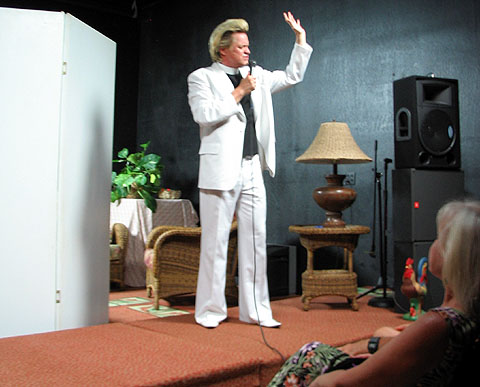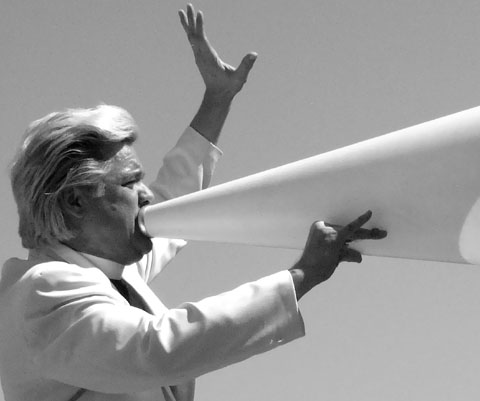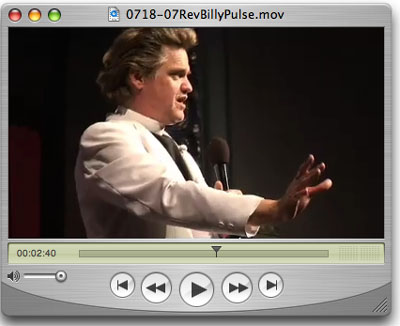[Editor's Note: the following is an article and interview, from the Haleakeka Times, with Reverend Billy during his one day trip to Hanapepe, Kauai, to preach the gospel according to The Curch of Stop Shopping.]
Reverend Billy preaches against consumerism in Hawaii
by Jon Letman on 28 August 2007 in The Haleakela Times
With the recent deaths of the Reverend Jerry Falwell and Tammy Faye (Bakker), we are reminded of the excesses and moral depravity of elevangelists in the 1980s.
The tear-streaked confessions of Jimmy Swaggart, the fall of Jim Bakker and Oral Roberts’ call for $8 million in donations lest God “call him home” all offered a glimpse into the Reverend as sinner.
Now in the 2000s, a different kind of Reverend provides a window into the excesses of environmental and economic destruction, self-indulgent consumption and a war industry funded by trans-national corporations and American tax dollars. That looking glass in which we reflect is the Reverend Billy of the Church of Stop Shopping.
A vocal and theatrical critic of what he calls the “sin of corporate consumerism,” Reverend Billy criss-crosses the nation preaching out against what he sees as the American equivalent of a demonic possession by trans-national corporations like Wal-Mart, Starbucks, Disney, Nike and Coca-Cola.
Go to the media page on the www.revbilly.com website and you’ll find more than 70 entries, from heavy hitters like The New York Times, Washington Post and BBC to Swedish National Radio and the Irish Green Party, examining phenomena like “shopocalypse,” cash register exorcisms and the question, “what would Jesus buy?”
Bill Talen is Reverend Billy, a performer and activist who, along with the Church of Stop Shopping Gospel choir and mushrooming congregation, rallies, rails and wails against America’s love affair with shopping and the money-driven consumer culture the Reverend believes is deadly to individuals, communities, local economies and the environment.
Dressed in gospel whites with an ark of blond hair, Reverend Billy organizes protests, parades, tent revivals, book readings, musical performances and retail interventions in an attempt to purge the world of an unsustainable pattern he says has bankrupted the nation economically, physically, intellectually, morally and spiritually.
The Reverend spreads the gospel of stop shopping in places like Wal-Mart’s corporate headquarters, at Victoria’s Secret shareholder meetings, in the Mall of America, at Starbucks everywhere and inside Disneyland where he was arrested for trespassing on Christmas Day.
Recently Reverend Billy and Savitri Durkee, director of the Church of Stop Shopping, traveled to Reykjavik to join the international Saving Iceland campaign in demonstrations and direct action against the damming and aluminum industrialization of the Icelandic wilderness.
Three weeks later, Reverend Billy and his director made their first and only appearance in the Hawaiian islands, on Kauai.
Reverend Billy arrived on the Garden Island only to find himself navigating through the same web of trans-national chain stores and big boxes he preaches against around the world.
But on a warm August night, at the locally owned and operated Storybook Theatre in Hanapepe, the faithful gathered to listen to the Reverend’s sermon. He began with a song.
There must be lights burning brighter somewhere/ Got to be birds flying higher in a sky more blue./ If I can dream of a better land, where all my brothers walk hand in hand./Tell me why, oh why, can’t my dream come true?
The Reverend sung the song slowly and methodically, its message, a plea for a better world where “strong winds of promise blow away doubt and fear,” was punctuated with nature metaphors. When he finished, Reverend Billy asked, “Anybody know that song?”
He explained that the song, “If I Can Dream” was recently sung on American Idol as a duet by Celine Dion and the holographic image of Elvis Presley as conjured up by special effects artists who impossibly paired the two.
The performance of these idols, one living, the other dead, the Reverend said, was a cultural phenomenon across the U.S. where 40 million people watched the Second Coming of Elvis on the Fox Broadcasting Company. The event was significant because it demonstrated the cynical rebranding of a song originally sung by Elvis at the finale of his 1968 comeback television special.
The song, it turns out, was written by Earl Brown who had been instructed by Elvis to write a pop song that would fit the mood of a nation in mourning just months after the assassinations of Dr. Martin Luther King and Robert Kennedy and at a time when the war was raging in Vietnam. The lyrics, Reverend Billy explained, were drawn directly from the words of Martin Luther King.
We’re lost in a cloud with too much rain. We’re trapped in a world that’s troubled with pain.
“Children,” began Reverend Billy, “that dream, which was sung by the cyber-reconstruction of Elvis, was rebranded. That dream was stolen. It is a serious thing that happened which we must recognize and reverse! Are we going to build something here today?”
“Amen! Hallelujah!” the audience shouted.
“Change-a-lujah,” the Reverend called back.
The Reverend continued, telling the audience that he wanted all to leave the theatre that night feeling the possibility of peace. (“give me a peace-a-lujah!”). He reminded the crowd that there is a war raging right now in Iraq and a world which is flabbergasted. There is effectively no real peace movement in the United States today.
“We better look really hard at what is happening to us right now because people are dying at this very moment as a result of our tax money. The horrific, horrific results of our passivity are something that we must know in our minds.”
The audience was captive, silent; the only sound came from a ceiling fan whirling overhead. Reverend Billy had moved seamlessly from what the night’s congregation thought was a light-hearted parody of TV pop culture to what he described as a web of trans-national sponsored corporate media, blind, happy consumerism, the military-industrial complex and an economy that drives and creates a violent foreign policy, exacerbating racial disharmony in America and death
and war in Vietnam and Iraq.
Kennedy and King, both assassinated in 1968, left a moral cavity in the American peace consciousness which, to this day argued Reverend Billy, has been left unfilled. Martin Luther King’s words, his dream of peace, became a hit song for Elvis in 1968 until its 2007 corporate cyber resurrection (complete with the American Idol logo drifting around Elvis like a “fluorescent drunk shark,” Reverend Billy noted).
“A little research indicates the company that owns the rights to that song, owns American Idol,” Reverend Billy revealed to facetious gasps. The Reverend reminded his audience that no less than five newspapers in Hawaii are owned by a media company which also owns part of Wal-Mart. “And which company gave more money to the GOP in the last election than any other?” Reverend Billy asked. Wal-Mart.
Reverend Billy’s voice bellowed infernally as he preached.
“Tax money finances war, this is just a fact. Communities roll over for war. You want sewage, water, reconfigured highways? Hallelujah, you’ve got it!”
The Reverend warned his flock not to get lost in 9/11 conspiracy theories, not to obsess about hating Bush and Cheney and not to fall prey to the drug of passivity.
“The reason we don’t have a peace movement in this country right now is because we are not dreaming. We are not dreaming of peace. We spend all our time masturbating over Bush and Cheney. ‘They’re so evil! Oh my god, they’re doing that and they’re doing that and they’re doing THAT!’” The Reverend stomped with feigned indignation.
“That’s not dreaming of peace. In the sense that Dr. King called the dream an action in and of itself, we will start a peace movement. Amen?”
Voices cried out from the darkened theatre, “AMEN!”
“We’re getting some faith here tonight,” Reverend Billy answered.
“I dare say very few people understood the dream that Celine Dion and Elvis were singing about. Here is a song that says, ‘if I can dream of peace, peace should happen. Why isn’t it happening?’”
The act of dreaming, the Reverend said, is a radical political social change action.
“That’s the same American radicalism that started this country and ended slavery. This is what Dr. King brought back up with his study of Mahatma Gandhi who sat in that hut for 90 days while he figured out what he was doing before he walked the long road across India to confront the salt monopoly of the British Empire.”
“It’s clear to me there is marginalization across our culture now. There are about six pejorative phrases that journalists use for those people that object to a highway widening or a 25-story building going up or a smelter going in at the end of a river or…”
“A SuperFerry coming to Kauai?” someone in the crowd shouted to wild applause.
“I feel good being here because we all have the dream of peace right under our nose,” Reverend Billy continued. “But we’ve become exhausted or resistant, let ourselves drift back, the dream has been stolen so thoroughly.”
“That dream of 40 years ago, in 1968, has been turned into products. Every social movement of the Sixties and Seventies has to inevitably be turned into a Starbucks flavor,” the Reverend lamented.
He warned that a dream cannot be an act of consumption.
“Our dream must be something we do with the chutzpah of Dr. King’s words. I’m going to let myself have that dream without undue influence. The dream will grow and complete itself.”
Like Gandhi confronting the British, like Dr. Martin Luther King, the dream requires a shift in pride, a recognition of the difference between the complex mysterious god-life and diversity in Hawaii and the industrialized patented mono-culture imposed from outside.The dream will be an action that will render complete power, the Reverend preached. The dream will offer solutions, and the body will follow the dreams into action to counter the specter of expanding big
box stores and faceless chains, the imposition of GMO crops, gentrified gated communities and trans-national military deals that alter the environment around us.The dream of peace is right here in a very strong way, Reverend Billy said. “Whoa, peace! Now that’s solid. Peace is real. Peace is sensuous. Peace feels good. Peace is real, it’s not abstract.”
“I think you do have faith here…. aloha. Aloha-lujah!” Reverend Billy was near the end of his sermon. The sweat on his brow glistened in the yellowish light, the ceiling fan still turned steadily overhead, but his voice had dropped to a near whisper, deliberate and powerful, but now an impassioned breath.
“I want to pray to the fabulous unknown, to the dream of Hawaii, to the mother-father-god of peace. We’re all singing that song but somehow we’ve left a few lines out. We’ve disconnected between thinking of something and acting on it.”
“That dream of peace, so well worked out, so imagined, so fed and grown, so supported… A dream of peace is also, at the same moment, the action of peace.”
Q and A with the Rev on Hawaii’s consumer culture
Reverend Billy and the Church of Stop Shopping are spreading their message of deliverance from rampant consumerism around the world. From Times Square to Disneyland, from Iceland and Argentina to Main Street, USA, Reverend Billy proselytizes unabashedly to consumers against the entrapments of over-consumption.
Earlier this month, divine intervention (or just really good timing) brought contributing writer Jon Letman together with Reverend Billy during his first, and to date, only sermon in the Hawaiian islands. In the shadow of luxury resorts and cruise lines off-loading big box consuming tourists, the Reverend Billy spoke up about local issues facing Hawaii. Aloha-lujah!
JL: What do you see here in Hawaii that merits the attention of potential stop-shoppers?
RB: To be an American consumer in Hawaii is really to forcibly turn your back on what this extraordinary place is. On Kauai, I’ve seen people getting off a cruise ship and into shuttle buses to go to a windowless big box called Wal-Mart. To consume here is to willfully deny a paradise offered to you. The generosity of this earthly paradise needs to be understood and explored and you can’t do that at a place like Wal-Mart.
Resistance to consumption is all about being local. In Hawaii you have such a generous environment, so much is given to you here. Turn away from that strawberry that was flown 2,000 miles to your table. You’ve got amazing fruit here.
JL: Despite the big box anti-sentiment by many in Hawaii, many others welcome them for their variety and (sometimes) lower prices. How do you convince the head of a household with five kids working two or more jobs that Wal-mart is not the way to go?
RB: We don’t judge anyone, but let’s find a way to slow down our consumption. You help me and I will help you. It has been proven that multi-nationals depress the local economy and their employees make much less per hour. But in the need to clothe and feed their families, people have to go back to trans-nationals and buy sweat shop products. It’s a cycle.
Each area of the world has its own local power that offer doorways out of that trap, that big box. Let us work toward native, local solutions and get out of the entrapments of processed food and expensive medicines. It takes work and discipline to shift what you enjoy, what you make time for and that’s not easy.
People make confessions and email revbilly.com and we try to discuss situations people are in. We are contacted by people who want to change.
JL: Do you see connections between the huge military presence in Hawaii and patterns of corporate consumption here?
RB: It is clear from the Iraq war, if it already wasn’t clear from previous colonial wars, that big companies like Bechtel, Alcoa and other large energy and weapons companies have direct ties to stores like Wal-mart and Home Depot. For years you’d always see Bush posing at a Home Depot. Wal-mart was the biggest donor to the GOP in the last election cycle.
The military is very much in bed with the idea of a consumer economy. Keep the people stupid, don’t let them be radical Americans like the kind that started this country. Let them be consumers because consumers will put up with sweat shops. Consumers don’t ask questions.
JL: There is a strong anti-development sentiment in Hawaii and yet the developers seem to be winning. Isn’t development, even gradual development, inevitable?
RB: Absolutely not. It is true they may have incredible momentum and they will come back and try to get even a single “yes.” Once they are here, it is hard to dislodge them.
Developers have stolen the idea of prosperity, the idea of future, and have copped the idea of growth, and people get waltzed into believing them. Now we know, and it has been proven, their idea of future is deadly. Their approach concentrates income in the hands of a few, it’s false advertising. We have to build up our dream so when they come, we’re not just protesters. We have to be able to know what we are, that we have a sustainable economy,
don’t want GMO, don’t want big boxes. It’s not so much a question of their power as it is of ours. Do we know how to develop our own language of a future that is working?
JL: Increasingly, Hawaii is becoming gentrified, communities where people are either very wealthy and can afford beautiful homes on huge properties, they work constantly just to get by, or else they are forced to move off island. What do you say to locals who have watched their islands turn into the new Aspen of the Pacific?
RB: Gentrification is the absence of god. It is just another form of the same force I am talking about – GMO agriculture, chain stores, big boxes. The defining characteristic is the same mono-culture. I have seen the same thing in New York, in Northern California. For example, there is a small town north of San Francisco called Bolinas that reminds me of Kauai. Orville Schell, the dean of the graduate school of journalism at UC Berkeley
wrote a book about Bolinas called The Town That Fought To Save Itself. The town had to be very creative to keep out the people that were trying to buy their way in. They denied water licenses, permits for new structures and severely curtailed new homes. They also kept tearing down the “Bolinas” sign the highway department put up.
Money was not always the mayor, not always the future.
In Hanapepe (on Kauai), I’ve seen wonderful local artwork. I witnessed a wonderful community center with a peace garden in the back. I’ve seen people who are devoted to the town building up local culture which is a way to build the local economy and you always get more power by believing in your local community.
pau
|
“What would Jesus buy,” a feature length film that follows Reverend Billy and the Church of Stop Shopping Gospel Choir as they travel the nation by bio-diesel fuel bus encouraging consumers to temper their consumption during the Christmas season will be released this November. The film was directed by Rob Van Alkemade and produced by Morgan Spurlock (“Super Size Me”). http://www.wwjbmovie.com/ |


